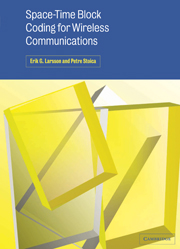Crossref Citations
This Book has been
cited by the following publications. This list is generated based on data provided by Crossref.
Larsson, E.G.
Ganesan, G.
Stoica, P.
and
Wing-Hin Wong
2002.
On the performance of orthogonal space-time block coding with quantized feedback.
IEEE Communications Letters,
Vol. 6,
Issue. 11,
p.
487.
Ganesan, G.
Stoica, P.
and
Larsson, E.G.
2002.
Diagonally weighted orthogonal space-time block codes.
Vol. 2,
Issue. ,
p.
1147.
Shahbazpanahi, S.
Beheshti, M.
Gershman, A.B.
Gharavi-Alkhansari, M.
and
Wong, K.M.
2003.
Minimum variance linear receivers for multi-access interference rejection in space-time block coded MIMO communication systems.
p.
1017.
Larsson, E.G.
and
Stoica, P.
2003.
Mean square error optimality of orthogonal space-time block codes.
Vol. 4,
Issue. ,
p.
2272.
Love, D.J.
Heath, R.W.
and
Strohmer, T.
2003.
Grassmannian beamforming for multiple-input multiple-output wireless systems.
IEEE Transactions on Information Theory,
Vol. 49,
Issue. 10,
p.
2735.
Larsson, E.G.
2003.
Unitary nonuniform space-time constellations for the broadcast channel.
IEEE Communications Letters,
Vol. 7,
Issue. 1,
p.
21.
Larsson, E.G.
and
Stoica, P.
2003.
Mean-square-error optimality of orthogonal space-time block codes.
IEEE Signal Processing Letters,
Vol. 10,
Issue. 11,
p.
327.
Larsson, E.G.
Stoica, P.
and
Li, Jian
2003.
Orthogonal space-time block codes: maximum likelihood detection for unknown channels and unstructured interferences.
IEEE Transactions on Signal Processing,
Vol. 51,
Issue. 2,
p.
362.
Shahbazpanahi, S.
Gershman, A.B.
and
Manton, J.H.
2004.
Closed-form blind decoding of orthogonal space-time block codes.
Vol. 4,
Issue. ,
p.
iv-473.
Jing Liu
Jian-Kang Zhang
and
Wong, K.M.
2004.
Optimal linear code design in improving ber for MIMO systems with MMSE receivers.
Vol. 2,
Issue. ,
p.
1666.
Larsson, E.G.
2004.
Constellation randomization (CoRa) for outage performance improvement on MIMO channels.
Vol. 1,
Issue. ,
p.
386.
Yuan Li
Fung, P.H.W.
Yan Wu
and
Sumei Sun
2004.
Performance analysis of MIMO system with serial concatenated bit-interleaved coded modulation and linear dispersion code.
p.
692.
Chengshan Xiao
and
Zheng, Y.R.
2004.
Ergodic capacity of MIMO triply selective rayleigh fading channels.
Vol. 5,
Issue. ,
p.
3133.
Jing Liu
Jian-Kang hang
and
Wong, K.M.
2004.
Design of optimal orthogonal linear codes in MIMO systems for MMSE receiver.
Vol. 4,
Issue. ,
p.
iv-725.
Ammar, N.
and
Ding, Z.
2004.
Frequency selective channel estimation in time-reversed space-time coding.
p.
1838.
Shahbazpanahi, S.
Gershman, A.B.
and
Manton, J.H.
2004.
A relaxed maximum likelihood approach to blind channel estimation and symbol detection in MIMO systems with orthogonal space-time block codes.
Vol. 1,
Issue. ,
p.
289.
Xuan Nam Tran
Taniguchi, T.
and
Karasawa, Y.
2004.
Adaptive beamforming for multiuser space-time block coded systems.
p.
745.
Shahbazpanahi, S.
Gershman, A.B.
and
Giannakis, G.B.
2004.
Semi-blind MIMO channel estimation for space-time coded space-division multiple-access systems.
p.
392.
Love, D.J.
Hosur, S.
Batra, A.
and
Heath, R.W.
2004.
Chase decoding for space-time codes.
Vol. 3,
Issue. ,
p.
1663.
Love, D.J.
and
Heath, R.W.
2004.
Limited feedback precoding for orthogonal space-time block codes.
Vol. 1,
Issue. ,
p.
561.





